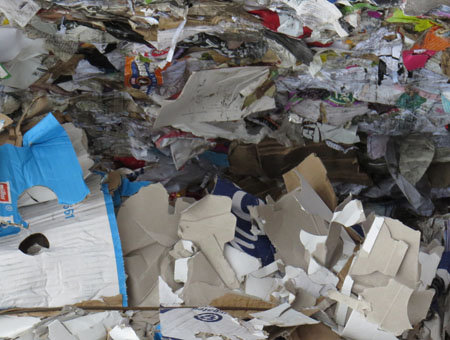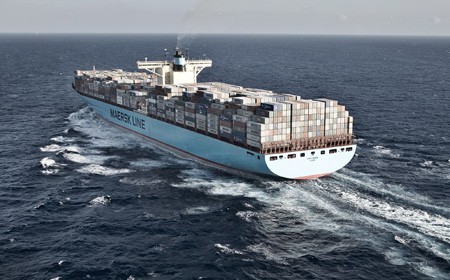China has formally told the World Trade Organisation of its plan to ban certain imports of waste materials from the end of 2017.
For the waste and recycling sector this is likely to impact on certain paper exports, textiles, metal and plastics. But, it does not mean that exports, such as mixed paper are banned, rather that sorting, quality and grade specifications will become more important than ever. Exporting of paper to China where the material is not sorted (ie contaminated and not in line with grade specifications) will be prohibited although it already generally is under existing rules.

Acceptable mixed paper. China will not accept unsorted paper from the end of the year but mixed can still be exported
The announcement, yesterday (18 July) has been widely expected. Ahead of the submission of its “Technical Barrier to Trade” notification to the WTO, there have been a number of private discussions involving UK exporters and Chinese buyers with the Chinese government and its ASQIQ customs authority. Following the discussions, exporting businesses and waste management companies in the UK are likely to have to pay even more attention to sorting processes, including resorting mixed paper where necessary.
However, the newer restrictions apply only to China and some poorer quality material could still find its way to other export markets, subject to meeting Environment Agency and EU export requirements.
‘Foreign Garbage’
The aim of the Chinese measure, says yesterday’s document from the Ministry of Environmental Protection of the People’s Republic of China, is to tackle illegal “Foreign Garbage”.
It notes that “the General Administration of Customs of China, Ministry of Environmental Protection of China, Ministry of Public Security of China and General Administration of Quality Supervision, Inspection and Quarantine of China, as well as the Special Actions of Striking of the Illegal Actions of Imported Solid Waste Processing and Utilizing Sectors by Ministry of Environmental Protection of China” found that “large amounts of dirty wastes or even hazardous wastes are mixed in the solid waste that can be used as raw materials. This polluted China’s environment seriously. To protect China’s environmental interests and people’s health, we urgently adjust the imported solid wastes list, and forbid the import of solid wastes that are highly polluted. Protection of human health or safety; Protection of animal or plant life or health; Protection of the environment.”
By the end of 2017, China will forbid the import of four waste classes: “24 kinds of solid wastes, including plastics waste from living sources, vanadium slag, unsorted waste paper and waste textile materials”.
OFFICIAL LIST OF MATERIALS COVERED BY RESTRICTIONS
The full list of materials covered by the import restriction is: Slag, dross (other than granulated slag), scalings and other waste from the manufacture of iron or steel. (HS 2619), Ash and residues (other than from the manufacture of iron or steel), containing arsenic, metals or their compounds. (HS 2620), Waste, parings and scrap, of plastics. (HS 3915), Waste of wool or of fine or coarse animal hair, including yarn waste but excluding garnetted stock. (HS 5103), Garnetted stock of wool or of fine or coarse animal hair. (HS 5104), Cotton waste (including yarn waste and garnetted stock). (HS 5202), Waste (including noils, yarn waste and garnetted stock) of man-made fibres. (HS 5505), Used or new rags, scrap twine, cordage, rope and cables and worn out articles of twine, cordage, rope or cables, of textile materials. (HS 6310), – Other, including unsorted waste and scrap (HS 4707).
Film

Quality ‘will be paramount’, according to senior exporters
The general view of a number of waste/recovered paper sector experts contacted by letsrecycle.com today was that it will be a fairly delicate situation going forward in terms of exports to China. Similarly plastics exporters are also aware of the need for improvement in quality, particularly regarding film grades. One exporter remarked that a lot of film would now have to be processed in the UK and even supermarkets would have to be more careful in collecting material back of store.
Paper sorting
One recovered paper sector expert with knowledge of the export market said that they would expect companies serving the local authority market to ensure sorting of MRF mixed paper is to a high standard although this could increase costs, either breaking down bales or via a loose process. They added that work “at the household end to tell the public about quality will also be important.”
Mixed papers can typically contain cereal boxes, junkmail, newspapers and magazines. There is a mixed paper grade under the EN643 system and there is a recognition that while this allows for 1.5% contraries, the industry is discussing a lower amount. Some in the sector feel that a “special mixed grade” may eventually be introduced for China.
Colin Clarke, managing director of Mark Lyndon Paper Enterprises UK, said that the company fully recognised the need to export a product to a high standard of quality. “While we are all still on a journey, we are aware that there is a need to get quality right as quality is paramount for the export market. At Mark Lyndon we are making a grade in the UK to the EN643 specification and the material is sorted.”
The post China confirms need to sort mixed papers appeared first on letsrecycle.com.
Source: letsrecycle.com Plastic


